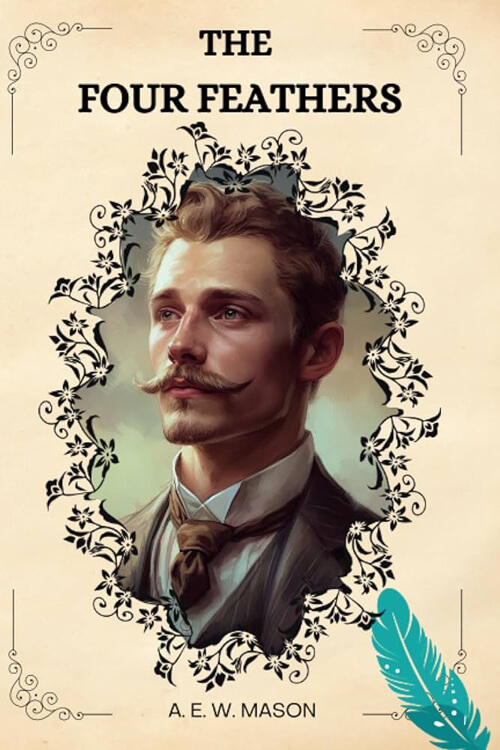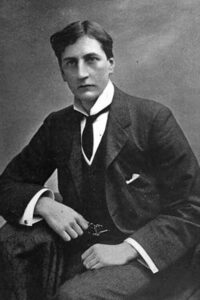
The Four Feathers
Lieutenant Sutch was the first of General Feversham’s guests to reach Broad Place. He arrived about five o’clock on an afternoon of sunshine in mid-June, and the old red-brick house, lodged on a southern slope of the Surrey hills, was glowing from a dark forest depth of pines with the warmth of a rare jewel. Lieutenant Sutch limped across the hall, where the portraits of the Fevershams rose one above the other to the ceiling, and went out onto the stone-flagged terrace at the back. There he found his host sitting erect like a boy, and gazing southward toward the Sussex Downs.
“How’s the leg?” asked General Feversham, as he rose briskly from his chair. He was a small wiry man, and, despite his white hair, alert. But the alertness was of the body. A bony face, with a high narrow forehead and steel-blue inexpressive eyes, suggested a barrenness of mind.
“It gave me trouble during the winter,” replied Sutch. “But that was to be expected.” General Feversham nodded, and for a little while both men were silent. From the terrace, the ground fell steeply to a wide level plain of brown earth and emerald fields and dark clumps of trees. From this plain voices rose through the sunshine, small but very clear. Far away toward Horsham a coil of white smoke from a train snaked rapidly in and out amongst the trees; and on the horizon rose the Downs, patched with white chalk.
“I thought that I should find you here,” said Sutch.
“It was my wife’s favorite corner,” answered Feversham in a quite emotionless voice. “She would sit here by the hour. She had a queer liking for wide and empty spaces.”
“Yes,” said Sutch. “She had imagination. Her thoughts could people them.”
General Feversham glanced at his companion as though he hardly understood. But he asked no questions. What he did not understand he habitually let slip from his mind as not worth comprehension. He spoke at once upon a different topic.
“There will be a leaf out of our table tonight.”
“Yes. Collins, Barberton, and Vaughan went this winter. Well, we are all permanently shelved upon the world’s half-pay list as it is. The obituary column is just the last formality which gazettes us out of the service altogether,” and Sutch stretched out and eased his crippled leg, which fourteen years ago that day had been crushed and twisted in the fall of a scaling ladder.
Read or download Book
A. E. W. Mason
Alfred Edward Woodley Mason (7 May 1865 – 22 November 1948) was an English author and Liberal Party Member of Parliament. He is best remembered for his 1902 novel of courage and cowardice in wartime, The Four Feathers, and is also known as the creator of Inspector Hanaud, a French detective who was an early template for Agatha Christie’s famous Hercule Poirot.
His prolific output in short stories and novels was frequently made and remade into films during his lifetime; though many of the silent versions have been lost or forgotten, the productions of Fire Over England (1937) and The Four Feathers (1939) remain enduring classics of British cinema.
Life
Mason was born in Camberwell. He studied at Dulwich College and graduated from Trinity College, Oxford, in 1888. He was a contemporary of fellow Liberal Anthony Hope, who went on to write the adventure novel The Prisoner of Zenda. He was an actor before he became a writer, and took the role of Major Plechanoff in the premiere of George Bernard Shaw’s Arms and the Man in 1894. He was also an avid cricket player.
Arthur Quiller-Couch and Oscar Wilde encouraged him to write, and his first novel, A Romance of Wastdale, was published in 1895. He was the author of more than 30 books, including At The Villa Rose (1910), a mystery novel in which he introduced his French detective, Inspector Hanaud; Hanaud’s career in six novels spanned from before World War I to after World War II.
His best-known book is The Four Feathers, which has been made into several films. Many consider it his masterpiece. Other books are The House of the Arrow (1924), No Other Tiger (1927), The Prisoner in the Opal (1929) and Fire Over England (1937). He contributed a short story, “The Conjurer”, to The Queen’s Book of the Red Cross.
Mason was elected as a Liberal Member of Parliament for Coventry in the 1906 general election. He served only a single term in Parliament, retiring at the next general election in January 1910.
His first play was the four-act comedy Marjory Strode. Mason wrote three plays that were produced and presented by Sir George Alexander in St James’s Theatre. He wrote, “I had three plays produced by George Alexander; one a failure, Colonel Smith, one which made a moderate profit, Open Windows, and one which was a considerable success, The Witness for the Defence. The light farce Colonel Smith opened on 23 April 1909. The Witness for the Defence opened on 1 February 1911, starring Sir George Alexander as Henry Thresk. In 1913 Mason’s problem play Open Windows opened on the evening of 11 March, starring Sydney Valentine as Phillip Hammond, Irene Vanbrugh as Cynthia Herrick, Sir George Alexander as John Herrick, with Rosalie Toller as Elsie Herrick.






